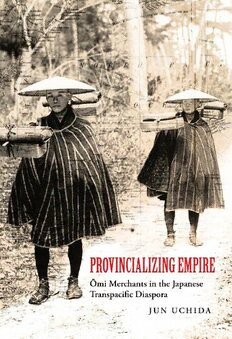
Provincializing Empire: Omi Merchants in the Japanese Transpacific Diaspora PDF
Preview Provincializing Empire: Omi Merchants in the Japanese Transpacific Diaspora
6 × 9 SPINE: 0.861 FLAPS: 0 U C H Provincializing Empire explores the global history of Japanese expansion I D through a regional lens. It rethinks the nation-centered geography and chronol- A ogy of empire by uncovering the pivotal role of expeditionary merchants from Ōmi (present-day Shiga Prefecture) and their modern successors. Tracing their P R lives from the early modern era, and writing them into the global histories of O empire, diaspora, and capitalism, Jun Uchida offers an innovative analysis of V expansion through a story previously untold: how the nation’s provincials built I N on their traditions to create a transpacific diaspora that stretched from Seoul to C I Vancouver, while helping shape the modern world of transoceanic exchange. A L I “Provincializing Empire offers a stimulating and persuasive account of the longue Z I durée of Japanese capitalist development, connecting Japanese historiography to N G important conversations on the history of racial capitalism and geographies of E space, place, and scale.”—DAVID AMBARAS, author of Japan’s Imperial M Underworlds: Intimate Encounters at the Borders of Empire P I R “Wide-ranging yet richly documented, Provincializing Empire offers a powerful E new transregional history of Japanese capitalism, challenging claims about the Ō developmental state. It tells the fascinating story of a merchant diaspora whose m growth was entwined with Japanese imperialism, and of the invented traditions i M that sustained provincial identity amid global commercial expansion.” e —JORDAN SAND, author of Tokyo Vernacular: Common Spaces, rc h Local Histories, Found Objects a n t s i Jun Uchida is Associate Professor of History at Stanford University and author of n t Brokers of Empire: Japanese Settler Colonialism in Korea, 1876–1945. h e J a p A Philip E. Lilienthal Book in Asian Studies a n Asia Pacific Modern, 18 e s e T r UNIVERSITY OF CALIFORNIA PRESS a n www.ucpress.edu sp a c A free ebook version of this title is available through Luminos, University of California Press’s ifi Open Access publishing program. Visit www.luminosoa.org to learn more. c D i a Cover design: Kevin Barrett Kane s p o Cover illustration: “Reenactment of itinerant peddlers from Ōmi r a in the Tokugawa period,” courtesy of the Archival Museum of ISBN: 978-0-520-39011-9 the Faculty of Economics, Shiga University, Japan; overlaid with The Pacific Ocean and Bordering Lands, courtesy David Rumsey 9 780520 390119 Map Collection, David Rumsey Map Center, Stanford Libraries. Luminos is the Open Access monograph publishing program from UC Press. Luminos provides a framework for preserving and reinvigorating monograph publishing for the future and increases the reach and visibility of important scholarly work. Titles published in the UC Press Luminos model are published with the same high standards for selection, peer review, production, and marketing as those in our traditional program. www.luminosoa.org ASIA PACIFIC MODERN Takashi Fujitani, Series Editor The publisher and the University of California Press Foundation gratefully acknowledge the generous support of the Philip E. Lilienthal Imprint in Asian Studies, established by a major gift from Sally Lilienthal. The Open Access edition is also funded by the National Endowment for the Humanities. Provincializing Empire Ōmi Merchants in the Japanese Transpacific Diaspora Jun Uchida UNIVERSITY OF CALIFORNIA PRESS University of California Press Oakland, California © 2023 by Jun Uchida This work is licensed under a Creative Commons (CC BY-NC-ND) license. To view a copy of the license, visit http://creativecommons.org/licenses. Suggested citation: Uchida, J. Provincializing Empire: Ōmi Merchants in the Japanese Transpacific Diaspora. Oakland: University of California Press, 2023. DOI: https://doi.org/10.1525/luminos.144 Cataloging-in-Publication Data is on file at the Library of Congress. ISBN 978-0-520-39011-9 (pbk. : alk. paper) ISBN 978-0-520-39012-6 (ebook) Manufactured in the United States of America 32 31 30 29 28 27 26 25 24 23 10 9 8 7 6 5 4 3 2 1 Contents List of Illustrations vii Acknowledgments ix Map of Japan and the Pacific World xiii Introduction 1 Part One. Ōmi Merchants in the Early Modern Era 1. The Rise of Ōmi Shōnin as Diasporic Traders 23 2. At the Nexus of Colonialism and Capitalism in Hokkaido 48 Part Two. Ōmi Merchants as a Model of Expansion 3. A Vision of Transpacific Expansion from the Periphery 81 4. The Production of Global Ōmi Shōnin 100 Part Three. Ōmi Merchants across the Transpacific Diaspora 5. The “Gōshū Zaibatsu” in Japan’s Cotton Empire 131 6. Ōmi Merchants in the Colonial World of Retail 167 7. A Shiga Immigrant Diaspora in Canada 202 Conclusion 235 Notes 243 Bibliography 299 Glossary-Index 339 Illustrations MAPS 1. Japan and the Pacific world xiii 2. Distribution of Ōmi merchants’ stores in the Tokugawa period 3 3. Shiga Prefecture (Ōmi Province), showing hometowns and trade routes of Ōmi merchants 24 4. Fisheries managed by Ōmi merchant contractors in early modern Hokkaido 59 5. A transpacific diaspora of Shiga people (ca. 1930) 77 6. Daiken Manufacturing and its overseas branches (1945) 162 7. Nakae Katsujirō’s travel itinerary (1924) 181 8. Bird’s-Eye View of Greater Keijō, by Yoshida Hatsusaburō (1929) 191 9. Minakai’s main store and its branches in Korea and Manchuria 199 FIGURES 1. Reenactment of itinerant peddlers from Ōmi in the Tokugawa period 2 2. Matsumae byōbu (screen), mid-18th century 55 3. Sugiura Shigetake (Jūgō) 82 4. Members of the Foreign Affairs Research Society 116 5. Wives of Ōmi merchants engaged in household chores 119 6. Itō Chūbē, the founder of Itōchū 140 7. Minakai’s clerks 173 8. Nakae Katsujirō’s travel diary (1924) 182 vii
